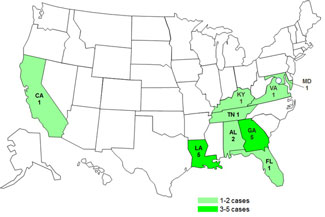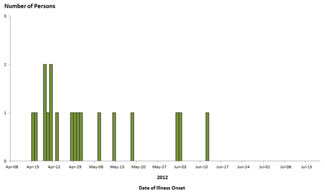2012 E. coli O145 Infections
Posted July 20, 2012 3:30 PM ET
This particular outbreak appears to be over. However, E. coli is still an important cause of human illness in the United States. More information about E. coli, and steps people can take to reduce their risk of infection, can be found on the CDC E. coli Web Page.
- Read the Advice to Consumers »
- A total of 18 persons infected with the outbreak strain of STEC O145 infection were identified in 9 states.
- The number of ill persons identified in each state was as follows: Alabama (2), California (1), Florida (1), Georgia (5), Kentucky (1), Louisiana (5), Maryland (1), Tennessee (1), and Virginia (1).
- Four ill persons were hospitalized. One death was reported in Louisiana.
- Dates for patients’ onset of illness ranged from April 15, 2012 to June 12, 2012.
- Based on interviews conducted, a source for these infections was not identified.
Introduction
CDC collaborated with public health officials in 9 states to investigate a multistate outbreak of Shiga toxin-producing Escherichia coli (STEC) O145 infections. Public health investigators used DNA “fingerprints” of STEC bacteria obtained through diagnostic testing with pulsed-field gel electrophoresis, or PFGE, to identify cases of illness that may have been part of this outbreak. They used data from PulseNet, the national subtyping network made up of state and local public health laboratories and federal food regulatory laboratories that performs molecular surveillance of foodborne infections.
A total of 18 individuals infected with the outbreak strain of STEC O145 were reported from 9 states. The number of ill persons identified in each state with the outbreak strain was as follows: Alabama (2), California (1), Florida (1), Georgia (5), Kentucky (1), Louisiana (5), Maryland (1), Tennessee (1), and Virginia (1).
Among 18 persons for whom information was available, illness onsets ranged from April 15, 2012 to June 12, 2012. Ill persons ranged in age from 1 to 79 years, and the median age was 33 years. Seventy-eight percent of patients were female. Four patients were hospitalized. One death was reported in Louisiana.
Investigation of the Outbreak
CDC initiated an investigation into this outbreak of illnesses on May 14, 2012 when six ill persons had been reported to CDC PulseNet from two states. CDC and state public health officials interviewed ill persons to obtain information regarding foods they might have eaten and other exposures in the week before illness. Based on interviews of 15 ill persons, a source for these infections was not identified.
Final Case Count Update
A total of 18 persons infected with the outbreak strain of STEC O145 were identified in 9 states: Alabama (2), California (1), Florida (1), Georgia (5), Kentucky (1), Louisiana (5), Maryland (1), Tennessee (1), and Virginia (1). Since the last update 3 new ill persons were identified in 3 states: Kentucky (1), Maryland (1), and Virginia (1).
Among persons for whom information was available, illness onset dates ranged from April 15, 2012 to June 12, 2012. Ill persons ranged in age from 1 year to 79 years, with a median age of 33 years; 78% were female. Four ill persons were hospitalized. One death was reported in Louisiana.
CDC and state public health officials interviewed ill persons to obtain information regarding foods they might have eaten and other exposures in the week before illness. Based on interviews of 15 ill persons, a source for these infections was not identified.
Case Count Update
A total of 15 persons infected with the outbreak strain of STEC O145 infection have been identified in 6 states: Alabama (2), California (1), Florida (1), Georgia (5), Louisiana (5), and Tennessee (1). Since the last update one new ill person has been identified in Louisiana with a reported illness onset of April 21, 2012. This is during the same time period as other ill persons in this outbreak.
Among persons for whom information is available, illness onset dates range from April 15, 2012 to May 12, 2012. Ill persons range in age from 1 year to 79 years old, with a median age of 31 years old; 73% are female. Four ill persons have been hospitalized. One death has been reported in Louisiana.
Illnesses that occurred after May 5, 2012 might not yet be reported due to the time it takes between when a person becomes ill and when the illness is reported.
It has been approximately 6 weeks since the last illness onset among reported cases. Although this indicates that the outbreak could be over, CDC continues to work with state public health officials to identify additional cases and the source of these STEC O145 infections.
State public health officials have been interviewing ill persons to obtain information regarding foods they might have eaten and other exposures in the week before illness. Based on interviews of 12 ill persons to date, a source for these infections has not been identified.
June 10, 2012
CDC is collaborating with public health officials in multiple states to investigate a multistate outbreak of Shiga toxin-producing Escherichia coli serogroup O145 (STEC O145) infections. Public health investigators are using DNA “fingerprints” of E. coli bacteria obtained through diagnostic testing with pulsed-field gel electrophoresis, or PFGE, to identify cases of illness that may be part of this outbreak. They are using data from PulseNet, the national subtyping network made up of state and local public health laboratories and federal food regulatory laboratories that performs molecular surveillance of foodborne infections.
The type of bacteria responsible for this outbreak is among those referred to as Shiga toxin-producing E. coli or STEC. STEC bacteria are grouped by serogroups (e.g., O157 or O145). The STEC serogroup found most commonly in U.S. patients is E. coli O157. Other E. coli serogroups in the STEC group, including O145, are sometimes called “non-O157 STECs.” Some types of STEC frequently cause severe disease, including bloody diarrhea and hemolytic uremic syndrome (HUS) which is a type of kidney failure. Currently, there are limited public health surveillance data on the occurrence of non-O157 STECs, including STEC O145; many STEC O145 infections may go undiagnosed or unreported. Compared with STEC O157 infections, identification of non-O157 STEC infections is more complex. First, clinical laboratories must test stool samples for the presence of Shiga toxins. Then, the positive samples must be sent to public health laboratories to look for non-O157 STEC. Clinical laboratories typically cannot identify non-O157 STEC. The STEC O145 PFGE pattern in this outbreak has not been seen in PulseNet before.
Investigation of the Outbreak
CDC initiated an investigation into this cluster of illnesses on May 14, 2012. At that time, six ill persons had been reported to CDC PulseNet from two states during May 3, 2012 to May 9, 2012. Although the most recent report of an illness to CDC was on June 4, 2012, their onset of illness occurred before May 10, 2012 and was during same period as other ill persons in this outbreak.
A total of 14 persons infected with the outbreak strain of STEC O145 infection have been identified in 6 states: Alabama (2), California (1), Florida (1), Georgia (5), Louisiana (4), and Tennessee (1). Among persons for whom information is available, illness onset dates range from April 15, 2012 to May 12, 2012. The time from the beginning of a patient’s illness to the confirmation that he or she was part of an outbreak is typically about 2-3 weeks. Please see the E. coli Outbreak Investigations: Timeline for Reporting Cases for more details. Ill persons range in age from 1 year to 79 years old, with a median age of 33 years old; 79% are female. Three ill persons have been hospitalized; one death has been reported in Louisiana.
It has been approximately 4 weeks since the last illness onset among reported cases. Although this indicates that the outbreak could be over, CDC continues to work with state public health officials to identify additional cases and the source of these STEC O145 infections.
State public health officials have been interviewing ill persons to obtain information regarding foods they might have eaten and other exposures in the week before illness. Based on interviews of 10 ill persons to date, a source for these infections has not been identified.

